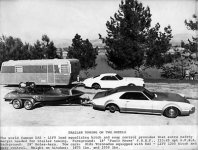I purchased the basic EAZ-Lift, which is made by Camco. The original/first designer and manufacturer of WDH systems. The same ones who famously took the rear wheels off Olds Toronados and towed trailers to advertise the systems.

I didn't add the optional mechanical sway control since my truck has an electronic sway control built in.
If you get a WDH with sway control, you'll want to disable the truck's electronic sway control. If you don't, the truck's electronic sway control and WDH's mechanical sway control can fight each other and wear both, the friction material out of the WDH and also wear the truck brakes out sooner.
Since my truck has electronic sway control I opted out of the mechanical sway control for the WDH so there would be no "wear items" in the hitch itself. As long as I maintain the brakes on the truck, I have good sway control.
The main issue I see with that Reese, is it is made to haul the same weight all the time. The parts that attach to the trailer frame would need disassembled and moved up and down on the brackets to adjust it for different weights. That requires having the proper wrenches and such in hand.
The second issue I see with the Reese, sway control isn't an option. There is friction material built into the brackets on the trailer that will wear and need inspected as an additional part of your maintenance and replaced as needed. If you don't have electronic sway control and need mechanical sway control, that is as good of way to do it as any. I personally prefer the mechanical sway control to be an option you add if needed.
With the Camco like I have, it has chains that attach the rear of the spring bars to the trailer frame. I can tow the empty trailer with just a plain drawbar and ball, or put the WDH drawbar on the truck and attach the spring bars with 6 links in the chain so there is very little tension for just a few thousand pounds of cargo, 5 links for more tension on heavier loads like my tractor, or 4 links for when I max out with my tractor and some extra implements. The only thing I have to do to adjust for more weight is jack the trailer higher when hooking stuff up so I can connect the chains up shorter.
This is the WDH I purchased:
Amazon.com: Eaz-Lift 4854 1,4 lbs Elite Bent Bar Weight Distributing Hitch with Adjustable Ball Mount and Shank: Automotive